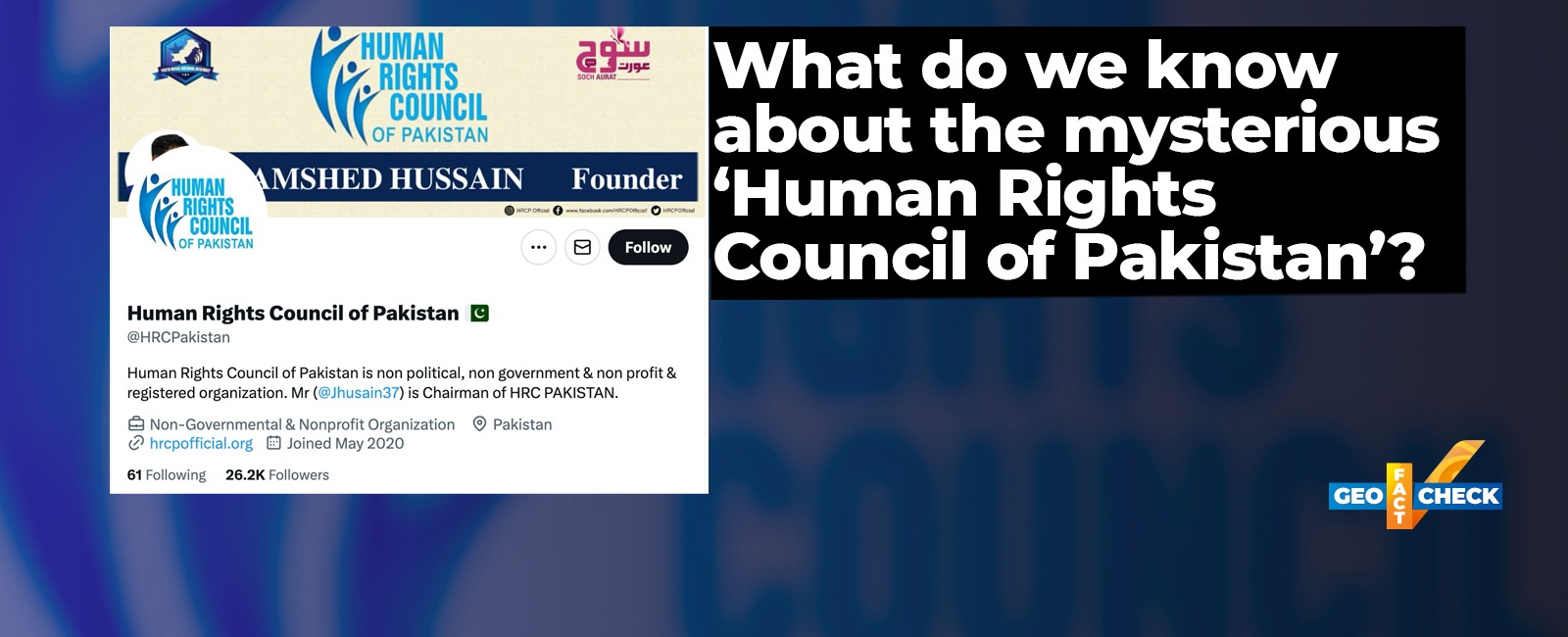What do we know about the mysterious 'Human Rights Council of Pakistan'?

On December 8, the Human Rights Commission of Pakistan (HRCP), an independent non-governmental organisation which has been advocating for human rights in the country for over three decades, posted an unusual statement on X, formerly known as Twitter.
“The Human Rights Commission of Pakistan (HRCP) would like to clarify that it is in no way associated with the handle @HRCPOfficial, being used by an organisation called the Human Rights Council of Pakistan,” the HRCP wrote.
The HRCP also called on the organisation to refrain from using the abbreviation ‘HRCP’, adding that it had moral rights over the abbreviation since its inception in 1986.
Maheen Pracha, the research and communication lead at the HRCP, told Geo Fact Check over the phone that they became aware of an organisation, by the name of the Human Rights Council of Pakistan, recently, when the latter suddenly became active on social media, to post about an award ceremony it hosted in December.
Soon after, the Lahore-based HRCP issued two public statements requesting the unknown Human Rights Council of Pakistan to desist from using the abbreviation ‘HRCP’.
“They have to date not responded to us,” Pracha said.
Who, what, where is the ‘Human Rights Council of Pakistan’?
On its website, the Human Rights Council of Pakistan claims to be a Karachi-based organisation which advocates for human rights in Pakistan. It further names Jamshed Hussain as its chairperson.
In its About Us section, it calls for making “the world a better place to live” in, while its mission statement is clumsily worded.
“We see the human rights are being dishonored everywhere on the name of color, creed, cast and religion. People who are fanatic in these subjected points made others deprived of their fundamental rights,” the statement read.
There is scant information about its staff, officer bearers, annual reports or financial audit reports.
In fact, the Jamshed Hussain is unknown to the activists and non-profits working on human rights in the country, who Geo Fact Check spoke to.
“Human rights organisations in Pakistan have a very small network,” HRCP’s Pracha said, “Everyone knows everyone. Yet, we had not heard of Mr. Hussain.”
Saroop Ijaz, the senior counsel Asia Division of the New York-based Human Rights Watch, who has two decades of experience as a lawyer and human rights advocate in Pakistan, also told Geo Fact Check that he was unaware of Jamshed Hussain’s previous work.
Ijaz further questioned why the organisation’s website was missing information. For a human rights group to inspire confidence in its work, Ijaz said, information about what it does and its source of funding, amongst other things, should be easily available.
Then, there are other anomalies.
Even though the Human Rights Council of Pakistan opened an account on X in 2020, it only uploaded its first post recently, on August 21, 2023, where it announced the appointment of its deputy secretary coordination.
Then, more recently, Pracha noticed that when the HRCP would issue a statement to highlight a human rights violation, the Human Rights Council of Pakistan would come out with a “similar sounding statement” soon after.
Not only that, Pracha said she also observed that the Human Rights Council of Pakistan’s online posts about harassment in the run-up to the general election, would usually favour one political party.
That political party, Geo Fact Check found, was former prime minister Imran Khan’s Pakistan Tehreek-e-Insaf.
Of the 1,783 posts the Human Rights Council of Pakistan has shared since August, several are regarding politicians affiliated with the PTI.
While recent incidents of state repression targeting the PTI have been documented by other human rights groups in Pakistan as well, but the Human Rights Council of Pakistan’s statements seem to reflect an implicit bias towards the party, which is at odds with how nonpartisan and independent human rights groups traditionally conduct themselves.
On December 26, for example, it posted about Pervez Khattak, a politician who was formerly associated with the PTI after speculation that the Election Commission of Pakistan was allotting PTI’s former election symbol of the “bat” to Khattak’s newly-created political party.
“Who allotted the symbol of the ‘bat’ to Pervez Khattak?” the Human Rights Council of Pakistan asked on Facebook, “Pakistan’s civil society and public want to hear from you Mr. Pervez Khattak.”
What does the chairperson have to say?
Jamshed Hussain, the chairperson of the Human Rights Council of Pakistan, identifies himself as the son of a labourer.
“I was sent to prison once,” Hussain told Geo Fact Check over the phone, “After I came out [of prison], I decided there were many [human rights] issues in Pakistan which needed to be highlighted.”
Soon after, on May 16, 2017, Hussain said he registered an organisation by the name of “Human Rights Council of Pakistan” in Karachi, under the Societies Registration Act 1860.
As per a document shared by Hussain, the organisation’s certification was renewed again in September till May 15, 2025. Geo Fact Check also found the Human Rights Council of Pakistan listed as a registered organisation, under the Societies Registration Act 1860, with Sindh’s Directorate of Industries.
Hussain further added that when he applied for registration with the Pakistan Centre for Philanthropy (PCP), a certification agency of the Federal Board of Revenue, the PCP officials raised concerns about the name of his organisation, which they said sounded similar to the well-known Human Rights Commission of Pakistan (HRCP).
“Everyone should have a right to choose any name they want,” Hussain insisted, “We are named “council”, and they are named “commission”. But obviously they [HRCP] are more senior to us.”
When asked why there was negligible information about the working of his organisation, including annual or audit reports or profiles of the office bearers, Hussain claimed that his organisation had over 200-300 members across Pakistan, seven office bearers and offices in Azad Jammu and Kashmir (AJK), Sindh and Khyber Pakhtunkhwa (KP).
But Hussain did not share profiles of his office bearers or audit reports or even the address of his offices in AJK and KP, with Geo Fact Check till the filing of this report.
He did, however, share via messages a purported “annual report” published by his organisation for the year 2022-2023.
Oddly, the 87-page “annual report” is largely a compilation of pictures of events and conferences hosted by the Human Rights Council of Pakistan, including a ceremony held in December where several Pakistani journalists and even a fashion designer, Maria B, were awarded.
The “annual report” further copy-paste texts from the 2022 World Report of the Human Rights Watch.
In fact, the “annual report” features no original research work compiled or produced by the Human Rights Council of Pakistan.
Yet, Hussain insists his organisation has been working tirelessly to raise human rights violations in Indian-occupied Kashmir as well as in Pakistan.
“Even when raising local issues we try to portray a better image of Pakistan [abroad],” he adds, “While also telling the truth of course.”
With additional reporting by Muhammad Binyameen Iqbal.





